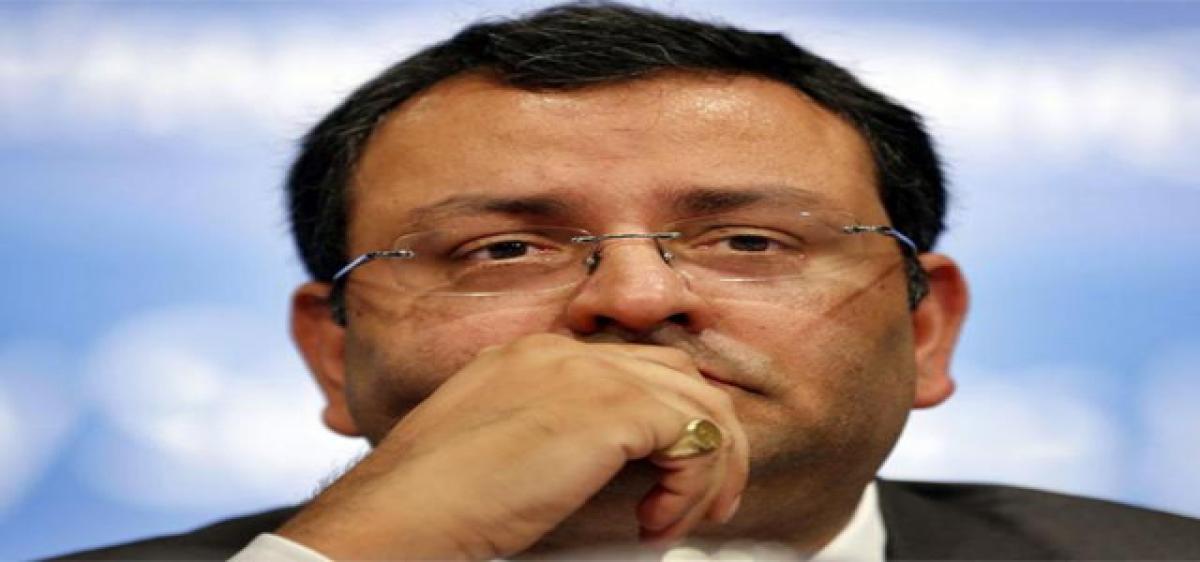Live
- Accused in stone pelting case arrested
- AAP Nominates Mayor and Deputy Mayor Candidates For Delhi MCD Elections
- Hyderabad: Eatala, Raghunandan, DK Aruna file nomination papers
- Chandrababu to hold Praja Galam election campaign in Kurnool today
- Rajasthan CM casts his vote, says BJP will repeat history
- Ex-MP CM Kamal Nath, son Nakul Nath cast votes in Chhindwara
- Hyderabad: HC directs police to permit Hanuman Vijaya Yatra rally with 100 bikes on April 23
- LS polls: PM Modi to campaign in UP, MP and Maharashtra today
- ‘Narmada Pushkara Kshetra Darsini’ book released
- Gold rates in Delhi slashes, check the rates on 19 April 2024
Just In

October 24 boardroom coup at Tata House, in which Ratan Tata was back to replace Chairman Cyrus Mistry, albeit as interim chief, has touched off an ugly spat between the Tata group and its single largest shareholder family, Shapoorji Pallonji Group.
October 24 boardroom coup at Tata House, in which Ratan Tata was back to replace Chairman Cyrus Mistry, albeit as interim chief, has touched off an ugly spat between the Tata group and its single largest shareholder family, Shapoorji Pallonji Group.
In normal course and with fair practices followed, this should cheer investors, as in the case of N R Narayana Murthy's comeback as Infy chairman, but markets gave their thumbs down.
The result: Market cap of Tata stocks shrank by over Rs 26,000 crore. Clearly, the landmark event in Indian corporate history is not looked upon as in the long-term interests of Tata Sons and the group’s investors.
The resultant bitter sparring between Mistry and Tatas has only exacerbated the goings-on at the 148-year-old group.
Tatas, always known for high corporate ethics and integrity, seemed to have failed in their fiduciary duty towards its investors. Business and industry circles apart, it is a shocking news to admirers of Tatas as well.
Even as palace intrigue details are trickling in, what has left the public dismayed is alleged backseat driving by Ratan Tata whose Air Asia investments are under government lens, following Mistry's charges.
Save for the cash cow of TCS and rare success of UK’s Jaguar and Land Rover, other group companies are hit by hard times. The failure of European venture of Tata Steel and feuding between Tata Teleservices and NTT Docomo are also a case in point.
The failure of Tata Nano also holds testimony to the group’s travails. Though dubbed as the world cheapest car and game-changer for the global automotive industry, Tata Nano failed to generate decent sales.
But the Tata group has no other option except continuing with the model as it is the brainchild of Ratan Tata who steered the group for over two decades before handing over the reins to Mistry in 2012.
Interestingly, the Tata patriarch played a key role in the selection of Mistry as his successor and mentored him for a year before giving him full charge of the $108-billion group. With Mistry’s ouster, the two have turned into bitter rivals now. The rivalry is likely to cost Tatas dearly as time goes by.
At 78, Rata Tata has now to field questions not only about the future of group companies but also about any erosion of finest values that Tata brand stands for. Whatever the reasons for the unceremonious exit of Mistry, Tata group actions will be under scrutiny.
Whether it has followed the well-established procedures is the main issue haunting investors and the public alike. Certainly, a no-holds-barred legal battle is in the offing between the sparring parties.
Discerning analysts and observers are sure to zero in on whether it is a case of clash of egos or merely management differences that led to this unsavoury episode.
This Tata mess shall be a wake-up call for the government, too, which should review applicability of Company Law with regard to bitter boardroom battles which often sacrifice investors’ interests.

© 2024 Hyderabad Media House Limited/The Hans India. All rights reserved. Powered by hocalwire.com







